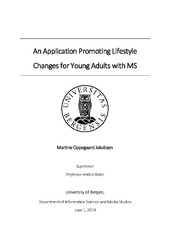An Application Promoting Lifestyle Changes for Young Adults with MS
Master thesis
Permanent lenke
https://hdl.handle.net/1956/20435Utgivelsesdato
2019-06-26Metadata
Vis full innførselSamlinger
- Master theses [247]
Sammendrag
This master thesis presents a Design Science research study of an application promoting a healthy lifestyle where the aim is to increase life quality for people with Multiple Sclerosis (MS). A User-Centered Design method was also integrated into the project to ensure that user requirements and approvals regarding content and design were achieved. The application is designed for young adults in Norway, who are newly diagnosed or people who seek information about how to increase life quality while living with the chronic disease MS. Nobody is a patient 24/7 and there is no need to be reminded of the disease if not necessary. With a self-management application, people with MS can take control of the condition when they are in asymptomatic periods, and hopefully, only feel the need to contact medical staff when absolutely needed. A high-fidelity prototype has been implemented where the main functionalities are health, training, patient notes for the next medical appointment, disease-related life and work issues, and a reward point system. The development processes consisted of five design iterations where design principles, usability testing, a system usability scale, and Nilsen’s heuristics were used to deliver satisfactory solutions. The resulting application YmsE strived to achieve the best balance between medical information and lifestyle information.
